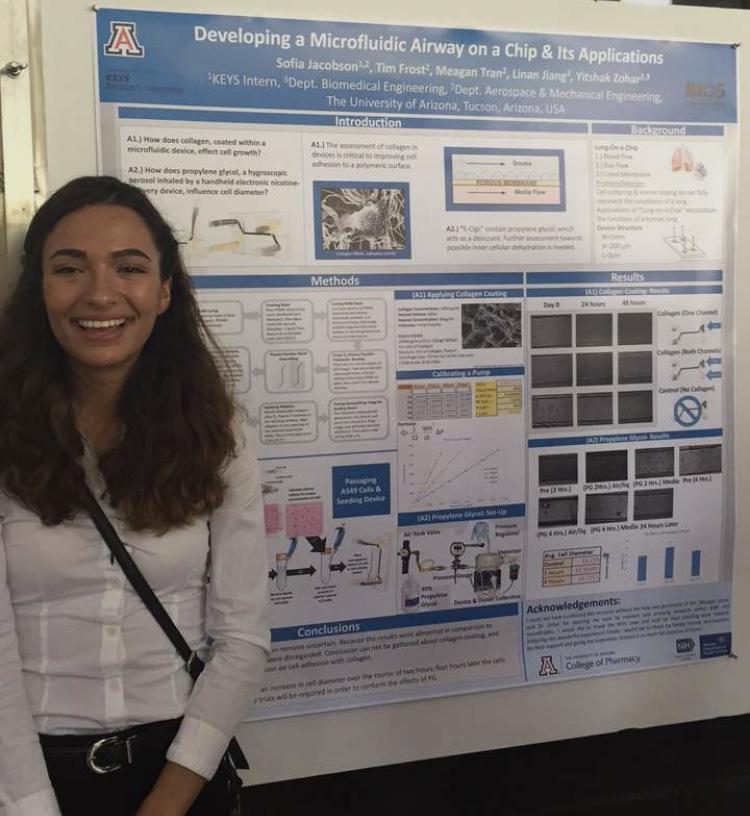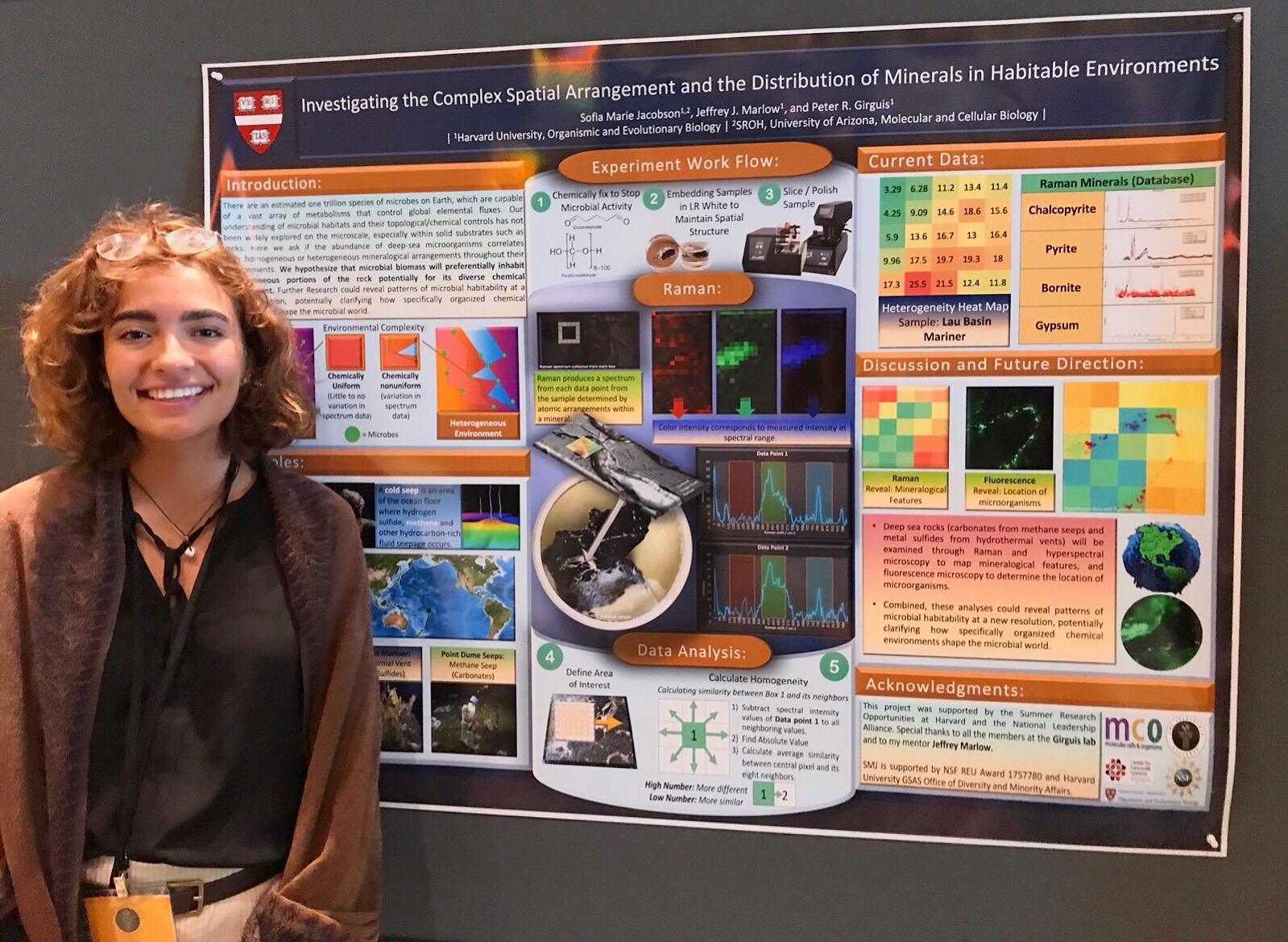Sofia Jacobson (MCB '22) was one of MCB's 2020 Margaret Bilson Scholarship awards winners.
Sofia shared a bit about what the award means to her, how she fell in love with Origins of Life research and how her summer plans have been impacted by the COVID19 pandemic.
 What does this award mean to you? Why is it meaningful?
What does this award mean to you? Why is it meaningful?
Receiving the Margaret Bilson scholarship is meaningful because during these current times I had no idea how I was going to pay my bills and purchase necessities. I like to take life day by day because if I don't, the stress of it all will overtake me. Every year before school starts, I apply for scholarships in hopes of paying for a year's worth of tuition. I have always had financial hardships in my life and I never imagined I would be able to go to college, but here I am working through college debt-free. As a second-generation immigrant and first of my family to go to college I am very fortunate and grateful for these opportunities because without them I wouldn't be here pursuing abiogenesis and Origins of Life (OoL) research.
Why did you choose UA and MCB?
During my freshman year of high school, I picked up a book called “Astrobiology: A Very Short Introduction” by David Catling. While reading it I was stunned. I always assumed that the mechanism behind the creation of life was well understood; but in fact, we are nowhere near understanding how life originated on earth. By the end of my sophomore year in high school, I was looking for OoL research opportunities but ended up empty-handed. However, disheartened by the lack of opportunities, I worked hard and had the tenacity and perseverance to seek out research opportunities to gain experience for this uncommon career choice. Because my research interest in OoL is not encompassed in a common major found in universities, I have been accumulating experiences and seeking out classes that tailor towards my research interest, so that I may be prepared to engage in research and ask questions relevant to my field.
What Labs have you worked in at the University of Arizona and what was your focus?
I first started doing research in high school with Yitshak Zohar through the KEYS program. I was able to learn about integrated microsystems and gain a greater understanding for microfluidic technology that can be used for bio/chemical/medical applications. Despite working with an amazing group of people I still had a hunger for origins of life research. I met Dr. Betul Kacar the summer before my freshman year at the University of Arizona. We utilized ancestral gene reconstruction on ancient enzymes to study the behavior of protein host systems to infer global-scale signatures. This research opened my eyes to the processes of evolution and how it is possible to go back in time to revive old phenotypes to infer information about early earth. One limitation I learned from OoL research is the lack of knowledge there is about early earth conditions; this is necessary because prebiotic chemistry experiments need to reflect a specific environment. I was beginning to dive into the prevalent problems that OoL researchers face and develop an overall understanding of the field. I was on a search for more interdisciplinary research surrounding the field and applied to the Leadership Alliance. Over summer 2019, I conducted deep-sea hydrothermal research with the Girguis lab at Harvard University. I explored the correlation between deep-sea microorganisms aggregating more on minerally complex surfaces or homogeneous surfaces. I was able to understand the importance of surface chemistry and chemical complexity with lifeforms. Reflecting on my past research experiences, I started focusing on the question: was life formed suspended in a liquid or on the surface of some early earth rock? This question led me to my current research opportunity at the University of Arizona with Professor Anthony Muscat as a NASA space grant fellow. As a junior, I currently work with ligands and chemicals to synthesize nanomaterials that self-assemble or have unique properties. This research has pushed me out of my comfort zone and allowed me to observe crucial insights into the properties of surface chemistry and self assembling structures.
How has coronavirus impacted your school and / or research?
For the summer of 2020 I received a Harvard University Origins of Life Initiative summer research fellowship. For over a year I have been coordinating with Daniel Duzdevich, a post doctorate researcher at the Szostak lab to do a project on exploring the RNA world hypothesis. Among biological systems, Mg2+ is an essential cofactor in many catalytic reactions, especially those involving RNA. However, soluble iron (II) would have been more abundant on the early earth. The goal of this project was to determine how iron (II) as the divalent cation would affect RNA primer extension. Unfortunately, due to the coronavirus I was unable to travel to Boston to do research under the Szostak Lab and will be postponing this opportunity to summer 2021. As students we must adapt to these circumstances and continue to build upon our education. Because of the generosity provided by the Anthony Muscat research group I was able to continue doing nanofabrication research, and I am so grateful for this opportunity. This summer I will be trying to understand the mechanisms of additive processes, such as self-assembly, to design and build molecular structures for inclusion in low-cost devices that have unique properties and functions. In the end my plans didn’t go the way I thought it was going to go, but I like to believe everything happens for a reason!
What would you say to a high school student considering UA and a science major?
If you find it exciting to dive into unanswered questions and use research as a tool to discovery, then there is definitely a type of science made for you! It is hard to find that interest right away, so my advice is to find a research lab and start doing internships, even if you are a freshman or a high school student. The sterile technique, measuring liquids, autoclaving, and making basic lab solutions will allow you to obtain valuable experiences. I also recommend working during the summer to gain a fast and valuable experience. Once you have worked in a lab your interests will have narrowed down, this will allow you to move into other labs and construct a resume with the new skills you have obtained! 
What are your hobbies and interests outside of school?
Outside of school and science, I spend my time crossing new hiking trails off my list with my fiancé Alex Esqueda, who also attends the University of Arizona as a neuroscience major. Long hikes are difficult especially if the terrain is rough, so we try to work out and build endurance to overcome these challenging hikes. I also love photography and the images you can create and portray to people that look at them. Photography is another way I like to incorporate ideas on cultural representation, diversity, and displaying all forms of beauty. Lastly, I also enjoy art, growing up my grandma taught me that it was a way to put ideas on paper and transform it with colors. I believe learning ways to express through art aided my journey in science because it allows a message to be communicated through other forms of media. Practicing diverse ways to be an effective communicator can make you a stronger scientist.





